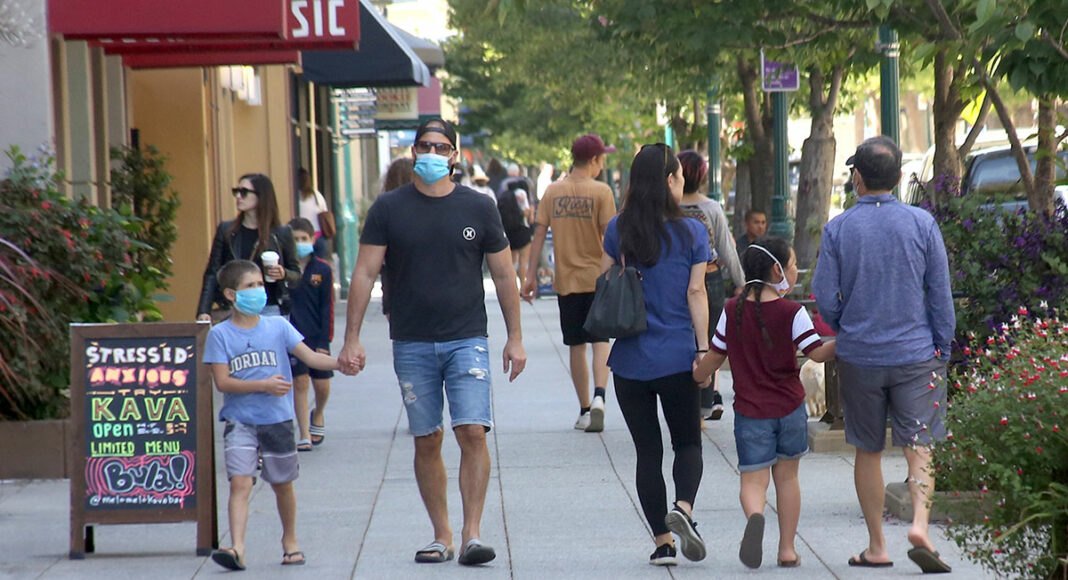As of Friday, residents of Santa Cruz County and many other areas of California may go out to the movies or to a bar for a drink.
But with the county still reeling from the Covid-19 pandemic, county residents may not invite a guest over to their home for a movie or a drink—at least not without violating health orders from Gov. Gavin Newsom and Santa Cruz County Public Health Officer Dr. Gail Newel.
There are now plenty of other things to do. Locals have been able to go out to eat at some restaurants since the beginning of June. Retail shopping and churches reopened last month. Hotels, swimming pools, gyms, and campgrounds are all reopening today—provided that business owners and operators can implement guidelines laid out by the state.
But mingling isn’t allowed.
“Gatherings are still not permitted outside of the household, even if it’s you and a friend, and that’s a governor guidance,” Newel said in a press conference Thursday.
Newel said that if anyone does meet up with someone outside of their household, they should practice social distancing measures.
“It’s safer to be outdoors, safer to stay six feet apart, safer to wear face coverings when you’re together, safer not to share food or drink because that means removing your face covering,” Newel continued. “Those are some of the guidelines to make time outside of your household unit safer.”
There have been 249 known Covid-19 cases in Santa Cruz County, according to information last updated by county health officials Wednesday night. Two people in the county have died from Covid-19, 34 have required hospitalization, and 197 have recovered. Statewide as of Wednesday, there have been 139,281 Covid-19 cases and 4,881 deaths, according to the California Department of Public Health.
In Santa Cruz County, the number of South County cases continues to climb, as does the county’s share of patients who are Latino. That racial inequity mirrors trends seen around the state and across the nation, with Covid-19 disproportionately hurting people of color. Newel attributes that troubling trend to a pre-existing racial wealth gap and to various social determinants of health, like lack of healthcare access, lack of access to healthy foods and poverty.
Deputy Public Health Officer Dr. David Ghilarducci added that people of color are more likely to be essential workers, thus making them more likely to get exposed to the virus.
Newel and Health Services Agency (HSA) Director Mimi Hall continue to worry that the pace of reopenings could lead to more sickness. But Newel still stops short of calling for stricter guidelines than the ones issued by the state of California. For the previous two weeks, it had been unclear why Newel was expressing doubt about the pace at which changes were happening while simultaneously allowing more uses to resume in the county.
Newel said Thursday that she’s been getting pressure to quickly reopen from the public, but not from county leadership.
“I want to be very clear that the county leadership—the county administrative officer and Board of Supervisors—have been extremely supportive of me and of all of our efforts in public health and the Health Services Agency,” Newel said. “I have received no pressure from them to reopen at all. I have heard loudly from the community voices—through town halls, from my emails and phone calls and through the Economic Recovery Council, the industry leaders with whom I work—the importance of reopening the economy, and I agree with them. As I’ve said before, the reality of death by poverty is very much a real thing. People die because they don’t have adequate housing and food and other things that poverty puts them at risk for.”
Newel also left open the possibility of shutting economic sectors back down again if new outbreaks get out of hand. In terms of a statewide strategy, that approach is not on the table for California officials, according to the Los Angeles Times, which reported that Newsom is not interested in moving backward toward tighter restrictions, even as cases inevitably climb.
After Thursday’s press conference, county spokesperson Jason Hoppin sent out an email that the county HSA would no longer continue its weekly press conferences, which for the most part have been held every Thursday morning since the start of April. Going forward, he wrote, the county will hold pressers on an “as needed” basis.
Since the previous press conference, held two weeks prior, the nation saw increased protests against police violence and racism. Newel opened up her comments Thursday by telling reporters that racism poses its own public health threats.
“Racism is a public health matter, as much as Covid-19 is a public health matter,” Newel said. “And we are committed to addressing that in our community, in our public health system, in our Health Services Agency and at the county level. We’ve been working hard at an equitable approach to our response to Covid-19.”
She added that the HSA has incorporated equity into its decisionmaking in its Covid-19 response.
“We will continue to work at this,” she said.














